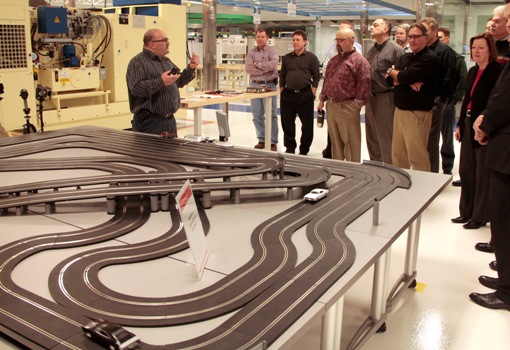I’ve always been a big fan of slot cars. When I was growing up, my brother and I had a large 1:32 scale track permanently mounted to a table in our basement. It was made in Chicago by a company called Strombecker.
In more recent years, I acquired a 1:24 scale slot car set (made in China by a German company) to rekindle some of my childhood memories of fun times with fast cars. I’ve used it several times with my 10-year-old nephew. The whizzing electric motors, rubber tires and fishtailing offer a 3D experience that you just don’t get with video games.
But, I’ve never associated slot cars with manufacturing, other than a factory that I visited a long time ago that had a track set up in its break room. So, naturally, my ears perked up the other day when I heard that Chrysler is using slot cars to teach its employees about manufacturing.
The 45-foot track is set up at the automaker’s new World Class Manufacturing Academy in Warren, MI. The 25,000-square-foot facility teaches lean manufacturing principles to assemblers as part of “an enriched culture of continuous improvement and learning.”
The facility features a variety of fun, hands-on activities. For instance, one exercise requires participants to assemble a child’s bike in the most efficient way possible. In another part of the facility, a door panel simulation line teaches the concept of kitting to eliminate waste, improve ergonomics and increase quality. Other labs focus on error proofing and waste reduction.
Slot cars are used to help demonstrate how small equipment breakdowns that can cause major headaches. The 1:32 scale slot car track is equipped with replicas of Chrysler and Fiat vehicles.
“The cars on the track and the track itself are altered to break down while racing,” says Scott Garberding, senior vice president of manufacturing at Chrysler. “A high-speed camera captures the movements, helping participants see that there might be more to the breakdown than what is obvious to the naked eye. In this way, operators are trained to apply a disciplined process to find the root cause of a problem.”
The Chrysler application uses a Fastcam MC2 from Photron Inc. “This compact, robust camera system consists of a processor with 2 GB memory and a single color camera head,” says Garberding. “It’s capable of recording up to 2,000 frames per second with up to four seconds of record time at 1,000 frames per second.”
This sounds like a cool application of machine vision technology. Does anyone know of other manufacturers using slot cars as an educational tool?


Recent Comments
Helpful for Trainees
Cable Assembly Manufacturers
Huawei for manufacturing?
should have a scanner and then 3D print the repair
IPC-A-610 and IPC-j-std-001